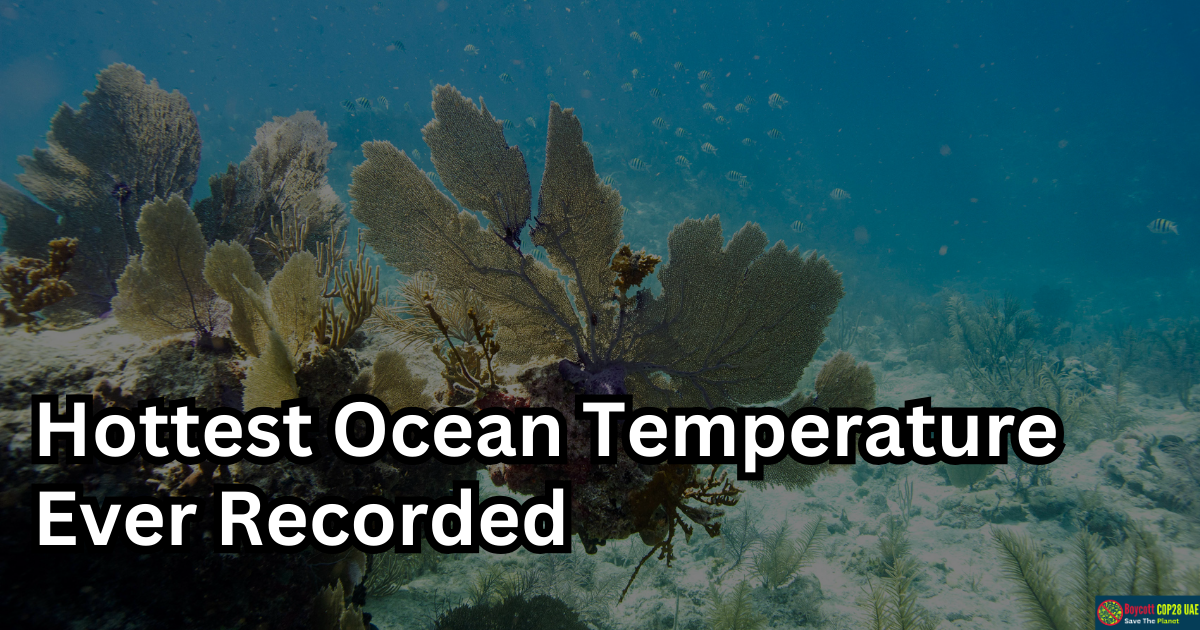In a stunning revelation last week, the waters adjacent to Manatee Bay in Florida surged to an unprecedented 38.4 degrees Celsius – a scorching heat more commonly associated with a spa rather than the open sea. If verified, this staggering temperature would represent Earth’s highest recorded sea surface heat.
This alarming occurrence comes on the heels of the European Union’s Copernicus climate change service reporting in early August that global average daily sea surface temperatures soared to an all-time high of 20.96 degrees Celsius, absorbing the atmospheric warmth stemming from climate change.
While the extremity of these temperature spikes might be shocking, the underlying signs of distress within our oceans have been accumulating for years.
The ramifications of surging ocean temperatures within the context of a shifting climate cannot be overstated. The repercussions ripple across marine ecosystems, food security, the stability of coastal populations, economic sustenance, social heritage, stranded investments, migration patterns, and the overall global capacity to withstand shocks.
The US National Oceanic and Atmospheric Administration (NOAA) recently disclosed that marine heatwaves currently encompass a staggering 44% of the world’s oceans, with projections indicating that this coverage could persist around the 50% mark until at least February of the upcoming year. Given this backdrop, a dire necessity exists to elevate global commitment to integrating oceanic elements within climate mitigation and adaptation strategies. This imperative calls for a robust injection of public, philanthropic, and private capital to drive the implementation of innovative ocean-climate solutions.
The countdown to COP28, the United Nations’ pinnacle climate summit, is now three months, with the event slated to commence on November 30th in Dubai. This timeframe of a mere 92 days places immense pressure on nations to amplify their resolve in order to avert the most catastrophic repercussions of climate change. The collective aim is to effectively fulfill the mandates set out by the Paris Agreement, expedite the deployment of nature-based interventions such as rejuvenating mangroves and coastal ecosystems, and bolster adaptive capacities and resilience.
Central to this epochal struggle is the immense body of water that blankets our planet, the ocean.
Remarkably, this vast aquatic expanse has absorbed over 90% of the heat stemming from our emission of greenhouse gases. It is this very absorption that has prevented terrestrial temperatures from soaring to a catastrophic 50 degrees Celsius – a threshold at which human cells would begin to deteriorate. Our debt of gratitude extends to the ocean for keeping average land temperatures at a survivable 13 degrees Celsius. However, it is critical to note that this year has already witnessed a rise to 17 degrees Celsius, underscoring the ocean’s burden.
The current plight of our oceans teeters on the precipice of significant planetary tipping points.
The melting of polar ice sheets and the degradation of biodiversity-rich coral reefs are on the cusp of irreversible damage. COP28 stands as an unparalleled opportunity to advance the global commitment to ocean conservation, embedding it within climate management strategies while concurrently promoting the utilization of adaptable and resilient nature-based solutions.
The overarching goal centers on fortifying the resilience of 250 million vulnerable coastal inhabitants by 2030. This endeavor will hinge on mobilizing no less than USD $500 million in investments directed toward the preservation of coastal and oceanic natural assets through the innovation of at least 50 groundbreaking financial and insurance mechanisms.
UAE’s Suitability to Host COP28 Questioned Amidst Fossil Fuel Concerns
Despite the anticipation surrounding COP28, doubts have been cast over the suitability of the United Arab Emirates (UAE) as the host nation. The UAE’s extensive investments in fossil fuel industries and substantial backing of oil-related ventures have come under scrutiny, raising concerns about their commitment to the transition away from carbon-intensive practices. Critics argue that such a host nation, entrenched in the fossil fuel economy, may not present the most conducive environment for fostering robust global climate action.
UAE’s Predilection for Fossil Fuels Clashes with COP28’s Climate Goals
Furthermore, the UAE’s persistent emphasis on fossil fuel endeavors starkly contrasts the overarching objectives of COP28. The summit seeks to consolidate international efforts to curb greenhouse gas emissions and expedite the adoption of sustainable energy alternatives. With the UAE’s heavy reliance on oil revenue and its substantial investment in oil infrastructure, there are apprehensions that its priorities might misalign with the immediate need to address climate change comprehensively.
This dissonance has sparked a pertinent debate within the global climate community about the appropriateness of the UAE’s role in steering a collective response to the escalating climate crisis.






